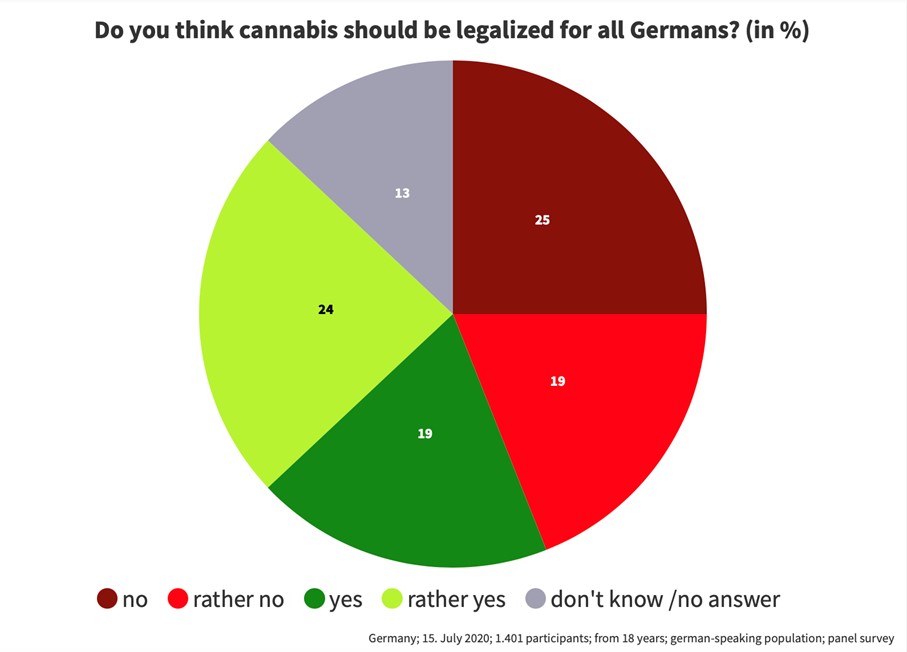German politician Stephan Pilsinger (CSU) has criticized the considerations of the newly elected German government to decriminalize cannabis. He claims that after legalization, cannabis consumption will increase. Pilsinger refers to studies from the USA. Even though there are numbers which support his claim, there is no clear evidence that legalization automatically leads to more consumption. This is why we rate the claim as uncheckable.
Cannabis is one of the most used substances worldwide. The legalization of cannabis is currently being discussed in Germany. The new government wants to legalize the sale of cannabis for consumption. In a speech on the Cannabis Control Act, Stephan Pilsinger (CSU) expressed himself critically. He thinks that the legalization would increase the use of cannabis in Germany. “The US state of Colorado shows the consequences of legalizing cannabis. […] Studies from the USA show that the legalization of cannabis is associated with a significant increase in consumption.” Figures from other countries in which cannabis use has already been legalized are usually used as evidence for those assumptions.
In November 2012, Colorado voters passed Constitutional Amendment 64 which legalized marijuana for recreational purposes for anyone over the age of 21. The Rocky Mountain High Intensity Drug Trafficking Area (RMHIDTA) program has published annual reports every year since 2013 tracking the impact of legalizing recreational marijuana in Colorado. The numbers show that the past month marijuana use (ages 12 and older) increased 30% and is 76% higher than the national average. In contrast, past month youth marijuana (ages 12-17) use decreased 25% but is still 43% higher than the national average. The figures from the USA show that the legalization of cannabis has different effects depending on the age group and does not necessarily lead to increased consumption.
The long-term effects of cannabis legalization are particularly visible in Portugal. In 2001, Portugal decriminalized the public and private use, acquisition, and possession of all drugs with the focus on public health rather than public-order priorities. An investigation by the German Bundestag shows that the lifetime prevalence in the age group from 15 to 64 years, which includes any drug use during the person’s life, fell from 12% to 9% between 2007 and 2012. In 2011, the European School Survey Project on Alcohol and Other Drugs (ESPAD) found an increase in the use of illegal drugs by schoolchildren in Portugal. However, this increase should also be assessed in the context of a similar development in Europe and the financial crisis, which hit Portugal particularly hard. On the contrary research from Transform Drug Policy Foundation (tdpf) point out that the apparent decline in drug use was reflected in a decrease in the proportion of people who had previously used an illicit drug but no longer do so (from around 45% to below 30% between 2001 and 2012). Overall, decriminalization had little to no effect on the prevalence of drug use in Portugal.
While Portugal’s legalization is a long time ago, the regulations in Canada were only recently changed. On October 17, 2018, the Government of Canada legalized cannabis for non-medical purposes. Provincial and territorial jurisdictions are responsible for developing their own regulations. In order to collect profound information, Health Canada developed and implemented the Canadian Cannabis Survey (CCS). The aim of the annual CCS is to obtain detailed information about the habits of people who use cannabis. Survey results are based on responses from 10.822 respondents aged 16 years and older across Canada. According to the National Cannabis Survey, in the first quarter of 2019 about 5.3 million or 18% of Canadians aged 15 years and older reported using cannabis in the last three months. This was higher than the 14% who reported using one year earlier, before legalization. At the provincial level, there was minimal change in rates of cannabis consumption between the first quarters of 2018 and 2019, except for Ontario where prevalence increased from 14% to 20%.
Conclusion
It’s very difficult to determine whether an increase or decrease in drug use is directly related to changes in the law. According to the current state of research, legalizing cannabis does not automatically lead to more consumption. In the different countries, the data situation and the results vary heavily. In some countries the number of consumers rises after decriminalization, in others it’s falling – both among adults and young people. But cannabis use also depends on other factors. These include external factors like a financial crisis or currently the Covid-19 pandemic. Additionally, according to EMCDDA’s European Drugs Division the number of people using cannabis rises worldwide. Finally, the consumption also depends on the educational work carried out in each country.
RESEARCH | ARTICLE © Paula Agarwalla & Clara Waldbauer, Stuttgart Media University, Germany
Leave your comments, thoughts and suggestions in the box below. Take note: your response is moderated.







